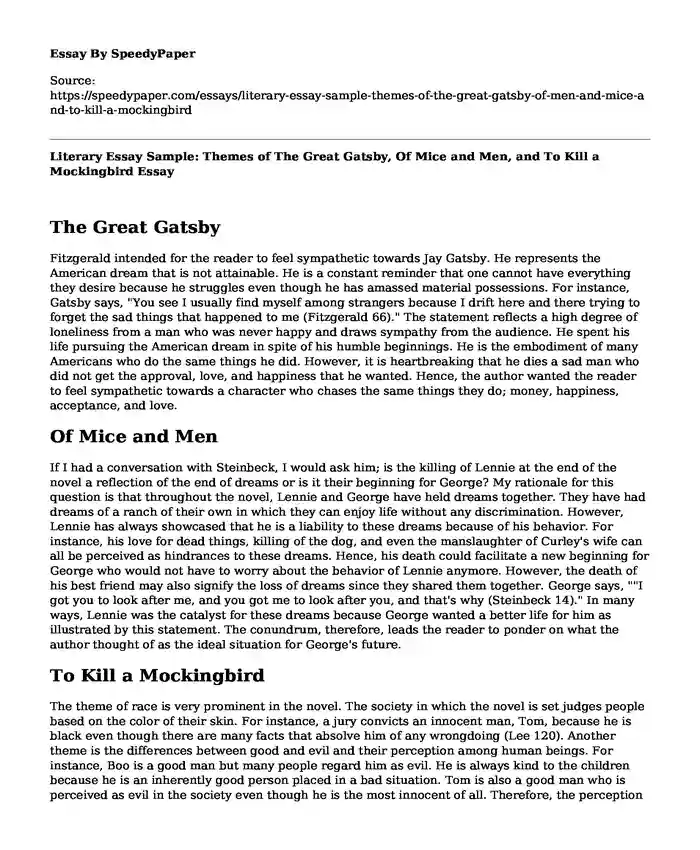
| Type of paper: | Essay |
| Categories: | Kill A Mockingbird Themes John Steinbeck The Great Gatsby Of Mice and Men F. Scott Fitzgerald |
| Pages: | 3 |
| Wordcount: | 727 words |
The Great Gatsby
Fitzgerald intended for the reader to feel sympathetic towards Jay Gatsby. He represents the American dream that is not attainable. He is a constant reminder that one cannot have everything they desire because he struggles even though he has amassed material possessions. For instance, Gatsby says, "You see I usually find myself among strangers because I drift here and there trying to forget the sad things that happened to me (Fitzgerald 66)." The statement reflects a high degree of loneliness from a man who was never happy and draws sympathy from the audience. He spent his life pursuing the American dream in spite of his humble beginnings. He is the embodiment of many Americans who do the same things he did. However, it is heartbreaking that he dies a sad man who did not get the approval, love, and happiness that he wanted. Hence, the author wanted the reader to feel sympathetic towards a character who chases the same things they do; money, happiness, acceptance, and love.
Of Mice and Men
If I had a conversation with Steinbeck, I would ask him; is the killing of Lennie at the end of the novel a reflection of the end of dreams or is it their beginning for George? My rationale for this question is that throughout the novel, Lennie and George have held dreams together. They have had dreams of a ranch of their own in which they can enjoy life without any discrimination. However, Lennie has always showcased that he is a liability to these dreams because of his behavior. For instance, his love for dead things, killing of the dog, and even the manslaughter of Curley's wife can all be perceived as hindrances to these dreams. Hence, his death could facilitate a new beginning for George who would not have to worry about the behavior of Lennie anymore. However, the death of his best friend may also signify the loss of dreams since they shared them together. George says, ""I got you to look after me, and you got me to look after you, and that's why (Steinbeck 14)." In many ways, Lennie was the catalyst for these dreams because George wanted a better life for him as illustrated by this statement. The conundrum, therefore, leads the reader to ponder on what the author thought of as the ideal situation for George's future.
To Kill a Mockingbird
The theme of race is very prominent in the novel. The society in which the novel is set judges people based on the color of their skin. For instance, a jury convicts an innocent man, Tom, because he is black even though there are many facts that absolve him of any wrongdoing (Lee 120). Another theme is the differences between good and evil and their perception among human beings. For instance, Boo is a good man but many people regard him as evil. He is always kind to the children because he is an inherently good person placed in a bad situation. Tom is also a good man who is perceived as evil in the society even though he is the most innocent of all. Therefore, the perception of evil lies in one's actions because the society will judge him based solely on this without taking into account the different circumstances involved. Femininity and gender is also another theme presented in the book. In this case, women are viewed from a certain light of what roles they should play in the society. For instance, Scout is viewed as a person who should not lay with others because she is a girl. She is regarded as weak and unable to handle the pressures of the world. The most important theme in this case is race. The rationale is that race is the beginning of all social inequality in this novel. For instance, Scout asks her father, ""You aren't really a nigger-lover, then, are you? (Lee 108)" because in her society, it matters to be black or associated with them. It portrays social status and determines the life of every character in the book. Race can also be used to explain aspects taking place in today's society.
Works Cited
Steinbeck, John. Of Mice and Men. New York: Dramatists Play Service, 1937. Print.
Fitzgerald, Francis S. The Great Gatsby. , 1998. Internet resource.
Lee, Harper. "To kill a mockingbird." Litigation (1990): 68-58.
Cite this page
Literary Essay Sample: Themes of The Great Gatsby, Of Mice and Men, and To Kill a Mockingbird. (2022, Jun 09). Retrieved from https://speedypaper.net/essays/literary-essay-sample-themes-of-the-great-gatsby-of-men-and-mice-and-to-kill-a-mockingbird
Request Removal
If you are the original author of this essay and no longer wish to have it published on the SpeedyPaper website, please click below to request its removal:
- Health Status and Health Education Needs in Haiti, Free Essay with the Article Review
- Legal Issues at a Pediatric Clinic, Free Essay in Healthcare Management
- Angelman Syndrome Paper Sample
- Essay Example on Tet Offensive
- Paper Example. Criminal Justice and Decent Performance
- Paper Example. the Observation of the Mural the Varrio Si, Yonkes No!
- Essay Sample on Effects of Earthquake on the Pediatric Population Group
Popular categories




